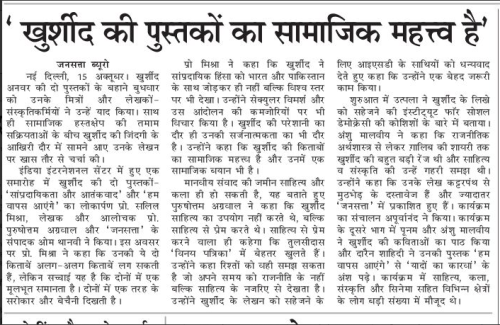Dear Khurshid
Can’t believe a year has passed since you took that fateful and unfortunate decision. For a long time after that day, I felt angry with you for the decision you took rather than wait for another day to fight for your honour. I also remembered the sad and anguished look on your face when we met the day before. I felt the pain that you were going through since I trusted you and the values you upheld. You said you will fight, but a few fanatics on what some call the “Idiot Box” shook your resolve. That caused the anger I felt.
But gradually the anger gave way to many sweet memories of the days in JNU as students. Two days back I was cleaning my office and found a certificate which said Inter-School Cricket (Winner). I told my students, who were present there, how you as captain declared the innings believing that SIS can never exceed the score put on by the School of Languages. We were not as young as your guys, not fit and past our playing days. You were confident, but you lost. You complained that SIS increased the number of Overs on the score sheet and won. We may or may not have, but did celebrate our victory. You were criticized by your team for having declared, though the score was big.
In recent past, you used to suddenly invite me and Malakar for dinner along with Azhar. What fantastic meat you cooked and Malakar was all praise for it. I used to avoid it since it was cooked in plenty of oil. But the evenings were wonderful since we reminisced about our student activist days, election time, contests within the AISF for posts, and so on. Ila used to complain why me only, why she is not invited.Since all in my family members like your cooking of non-veg, they would have loved it. But we had our group which met time to time and had great fun.
Whenever anything is discussed about the Urdu department in JNU, I always say it is poorer because the Centre could not retain a scholar like you. I was really proud when you started writing again for newspapers. I have seen you rising like a phoenix after leaving a big organization and building you own. That takes a lot of courage and hard work. I wish you had shown the same qualities before you took that decision a year ago.
Ajay Patnaik






























